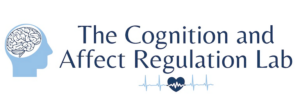The CAR lab examines cognitive and affective processes involved in the regulation of negative affect, in an effort to identify vulnerability factors for mood disorders. For example, how do people help themselves to feel better when they feel sad – and how do these processes go awry in depression?
We take a multi-method approach to examining individual differences in styles of thinking and regulating negative affect. This work involves laboratory-based measures of brain activity (using fMRI), autonomic nervous system functioning (heart rate variability and respiration), and behavior (executive functioning tasks and questionnaires). In addition, to understand behavior outside of the lab, we utilize ambulatory assessment to measure variability in autonomic activity (with wearables), sleep quality (with actigraphy), affect and regulation strategies (using ecological momentary assessment), and digital phenotyping approaches to measuring behavior (using smartphone keyboard metadata with the BiAffect app, developed by collaborators at University of Illinois at Chicago).
Studying individuals over time allows us to examine questions at multiple levels of analysis. For example, we ask questions at both the between-subject level (e.g., how do individuals differ from one another?) and at the within-subject level (e.g., how do individuals vary over time relative to their own baseline, and in what contexts might their risk be greatest?).
By understanding the mechanisms underlying successful affect regulation, we aim to inform the development of personalized, real-time interventions to improve behavioral flexibility and regulatory success, and in doing so, to reduce risk for problems such as depression and suicide.
Seeley G. Mudd Building
3620 McClintock Ave
Los Angeles, CA 90089
